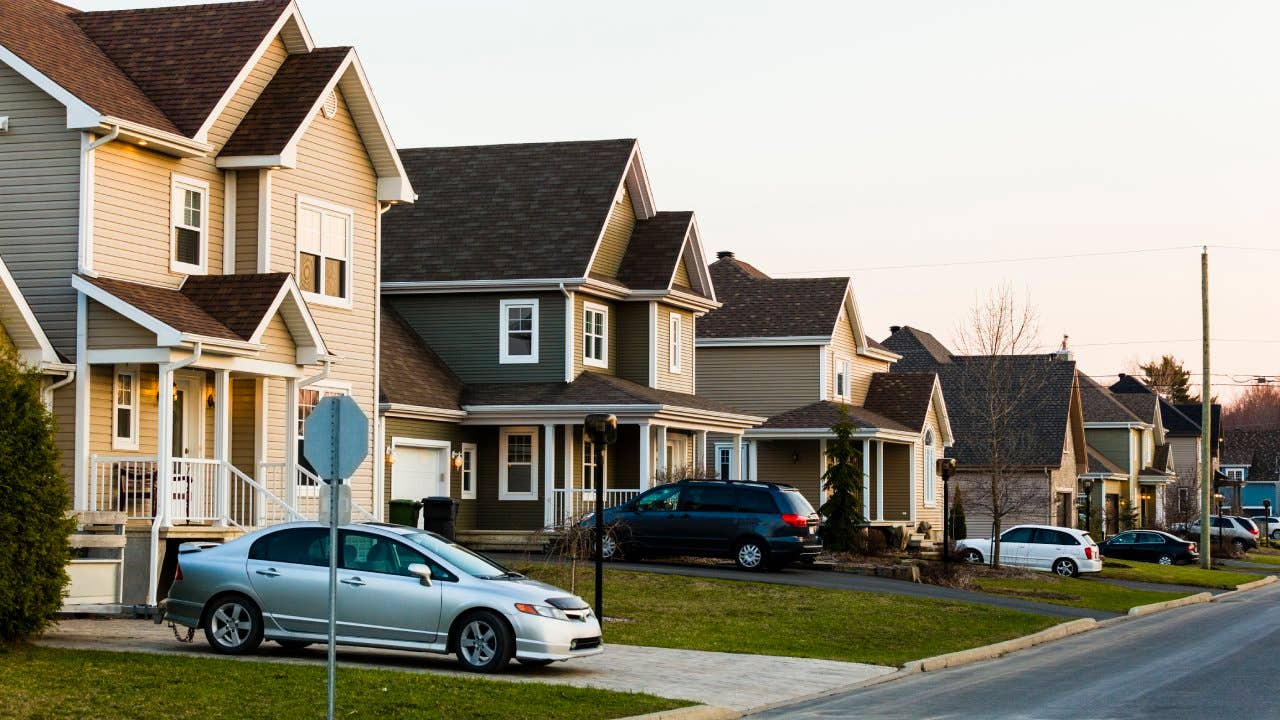Should I buy a house or a car first?

What comes first: the home or the vehicle? It’s a question people have probably been asking since the Model T hit the road. The answer depends on your specific financial situation: Since both houses and cars cost a significant chunk of change, you’ll need to weigh your options carefully. We asked the experts about which factors to consider to make the best, most financially savvy choice for you.
What should I buy first?
Should you buy a car or a house first? To help you decide, here are four factors to look closely at:
The state of the housing and car markets
Interest rates are climbing right now, and that applies to both mortgages and auto loans. In addition, inventories of both homes and vehicles are low. In other words, it isn’t an overly affordable time to buy either one. If interest rates creep down or inventory goes up in one of the two markets, that could be a sign to strike in that particular category.
For now, though, it can help to look at the long-term. For example, cars generally depreciate over the years, while the value of real estate tends to rise. “Housing markets move in cycles, but houses will almost always appreciate to some degree over time,” says Katie Wishneff, a Realtor at William Means Real Estate in Charleston, South Carolina.
Your purchase timeline
Do you need to make a purchase soon? Are you unsure of where you’ll be in the next several years? Buying a car can happen more quickly than buying a house, and unlike a house, your car can go with you no matter where you live.
“Buying a home is complicated,” says Michael Gifford, CEO of Splitero, which helps homeowners access their home equity. “It should start with loan qualification. After the pre-qualification process, buyers can start the search for their home. Potential home buyers should consider long-term scenarios [like] a change in employment status or income and the property’s resale and rental potential.”
In other words, when you buy a home, you really need to think about the big picture. A car purchase doesn’t require the same level of forward thinking.
Your savings
The question of whether or not you should buy a house is moot if you can’t afford the high cost of homeownership. Consider whether you have enough cash saved for a down payment, plus closing costs and monthly mortgage payments, as well as the cost of upkeep. Bankrate’s new-house calculator can also help you crunch the numbers to determine if homeownership fits your current financial situation. If not, a car is probably the answer, for now.
Your credit
To secure either an auto loan or a mortgage, you’ll need good credit. In general, buyers need a credit score of at least 620 to buy a house, and 600 to buy a car. Higher is better in both cases.
Creditworthiness comes down to more than a three-digit number, though. It means looking at your financial situation and determining if you can reasonably carry the amount of debt you’re considering taking on. There’s a common guideline that can help you determine your limits: “People often refer to the 28/36 rule,” says Courtney Klosterman, home insights expert at Hippo Insurance. “With this rule, your housing expenses shouldn’t exceed 28 percent of your annual income, and your total debt shouldn’t exceed 36 percent of your annual income.” Total debt includes car payments as well as housing costs.
Buying a car first
If you need both housing and a ride, a car is an easier, more affordable place to start — especially if you buy used. For more help deciding if you should buy a new or used vehicle, check our guide on the subject.
“If you need a car, particularly for work, I’d advise going with that first,” Wishneff says. “You can’t build wealth without employment!”
Will buying a car affect your ability to buy a house, though? Yes, at least temporarily. You likely can’t turn around and buy a house right after a major purchase like a car. Opening the new credit account that is your auto loan typically causes a short-term dip in your credit score. It will also affect your debt-to-income or DTI ratio, which home lenders consider when you apply for financing. Over the years though, as you make your car payments on time, this debt can help you build a stronger credit score, getting you a better mortgage interest rate when the time comes. And when interest rates do come back down, refinancing your car loan can be simpler and cheaper than refinancing a mortgage.
Buying a house first
If you can comfortably afford the down payment and mortgage that would come with buying a house, and you plan to live in the same place for at least the next five years or so, consider purchasing a house first. As long as you can get to your job reliably, via public transportation or any other way, locking in your home comes with some major perks.
“The primary financial benefit of homeownership is that it’s considered a low-risk investment that historically appreciates in value over time,” says Curtis Wood, CEO of Florida mortgage app Bee. Additional benefits, he says, can include property tax deductions, capital gains exclusion and other preferential tax treatment.
“There’s also a major psychological advantage,” Wood adds. “Homeownership is the foundation of almost all wealth creation. Your home is not only your nest egg but the emotional foundation to grow and extend your wealth outside the home into other assets.”
Klosterman agrees: “Buying a home, especially as a first-time homebuyer, is thrilling,” she says. “You get to move to a space that’s yours to decorate, use and enjoy as you like. However, with that privilege comes a lot of responsibility. Think: the financial load, the upkeep and the unexpected repairs. Being a homeowner is hard work, but it’s usually worth it.”
Getting preapproved for a mortgage is a good first step to help you determine how much house you can comfortably afford.
What should I do?
If it’s viable for you financially, and you’ll still have reliable transportation to work, most experts recommend getting a house first.
“Real estate typically appreciates over time and should be prioritized over a vehicle, if possible,” Gifford says. “Vehicles usually depreciate the minute they are purchased and driven off the lot. If a consumer is deciding between buying a car or home first, a home will be a better investment for them in the long run.”
“Definitely buy a home first,” Wood agrees. “Property tends to appreciate better than cars do, plus most vehicles lose value for a long period of time until they become collectibles. Compared to home-value appreciation during that same period of time, it makes a lot more sense to buy a home or property than a car.”
“Owning a home can be one of the most formative, impactful experiences in someone’s adult life,” Klosterman says. “Some people think of homeownership as a rite of passage, and for many, a home is the most important asset in their financial portfolio.”
Next steps
Start the homebuying process by teaming up with with a real estate agent you can trust. “Talk to a reputable Realtor and a lender to understand which options will work best for you,” Wishneff says. “It’s not a decision you want to take lightly. A knowledgeable and reliable lender and Realtor will help guide you.”
If you’re unable to get to work without a car and decide to go that route first, shop around for the best car loan rates. The more you can save on a car now, the more you’ll have to put toward your first home in the future.
FAQs
-
Probably not, unless you’re able to pay for at least one of the two in cash. Getting a loan for either a home or a car requires a good credit score, and starting a new loan will likely cause your score to dip, at least temporarily. It’s best to space these major purchases out so you can get the best interest rate on the loans you’ll need for each.
-
Yes. First, look at the market. Interest rates are high right now, meaning it’s not a great time to buy either a home or a car. Of course, you might need housing or transportation regardless of market conditions. If you can’t wait out the market, consider your financial situation carefully. Can you comfortably afford a down payment, closing costs and monthly mortgage? A car is likely to be more affordable than a house, so it might be best to settle for reliable transportation until homeownership is more within your means.
-
Yes. Specifically, it affects two major things that mortgage lenders consider: your credit score and your debt-to-income ratio. In the short term, it hurts both of these things. But over time, assuming you manage your loan well and make the payments on time, a car loan can give your credit score a boost — which in turn can help you get a better mortgage interest rate.
-
Quite the opposite, actually. Paying off your loan means it gets removed from your debt-to-income calculation, giving you a better DTI ratio. That, in turn, helps your chances of getting approved for a good mortgage rate. Paying off the loan in full also shows mortgage lenders that you know how to responsibly manage debt, further helping your chances of buying a home.
Why we ask for feedback Your feedback helps us improve our content and services. It takes less than a minute to complete.
Your responses are anonymous and will only be used for improving our website.
You may also like

Should I buy a house now, or wait?





